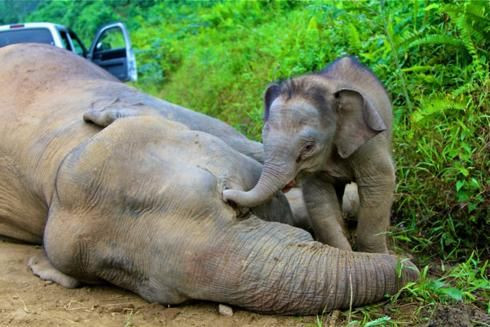Why Were 10 Borneo Pygmy Elephants Found Dead In The Malaysian Forest? Officials Suspect Poisoning

It is believed that 10 dead Borneo pygmy elephants were poisoned in the Malaysian forest, the Associated Press reported.
There were “mysterious circumstances” surrounding the pachyderms' demise, wildlife officials said Tuesday.
The carcasses of the baby-faced elephants were discovered near each other over several weeks at the Gunung Rara Forest Reserve, according to the director of the wildlife department in Malaysia's Sabah state on Borneo island, Laurentius Ambu.
Officers said they were able to rescue a 3-month-old calf that was apparently trying to wake its deceased mother.
"It was actually a very sad sight to see all those dead elephants, especially one of the dead females who had a very young calf of about three months old. The calf was trying to wake the dead mother up," said Ambu.
Sabah Environmental Minister Masidi Manjun told the AP that officials believe it's a case of poisoning, but had not determined whether it was intentional.
"This is a very sad day for conservation and Sabah. The death of these majestic and severely endangered Bornean elephants is a great loss to the state," Masidi said in a statement. "If indeed these poor elephants were maliciously poisoned, I would personally make sure that the culprits would be brought to justice and pay for their crime."
According to the WWF wildlife, fewer than 1,500 Borneo pygmy elephants remain. They are famously known for their baby-like faces, big ears and long tails and were found to be a subspecies in 2003 only after DNA testing.
Their numbers had actually stabilized in recent years, the news site wrote.
None of the baby-faced creatures had gunshot wounds and it appears they passed from severe hemorrhages and ulcers in their gastrointestinal tracts.
"We highly suspect that it might be some form of acute poisoning from something that they had eaten, but we are still waiting for the laboratory results," Nathan said.
© Copyright IBTimes 2025. All rights reserved.






















